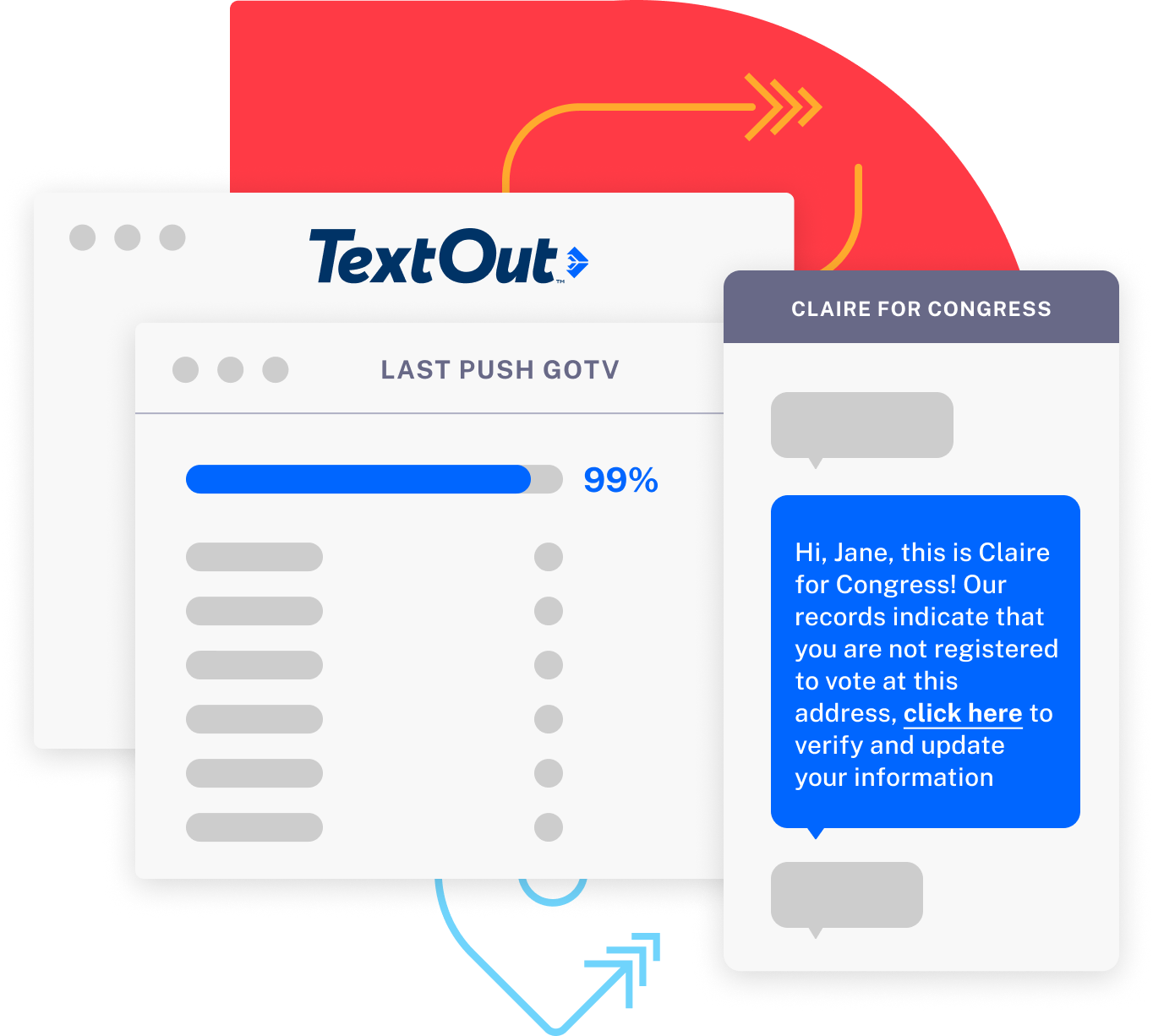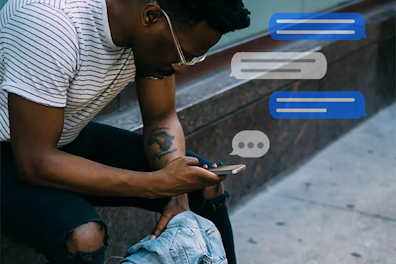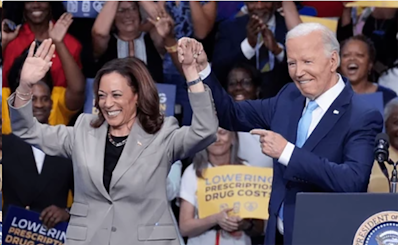Table of Contents
Introduction
While many campaigns use texting for voter mobilization and fundraising outreach, using texting for listening to voters is an opportunity for effective and strategic voter contact. Listening campaigns also energize people and help build trust in the months before Election Day.
In this blog, we will walk you through the process of listening to your audience, how to run a listening campaign, the best practices for texting campaigns like this, the benefits of listening, and more.
You might be asking yourself, what is a listening campaign? Let’s walk through it.
What is a texting listening campaign, and why does it matter?
Texting listening programs gather information from constituents, voters, and residents via text message. These campaigns include one or more texts asking recipients about their values, the issues that concern them, and questions they might have for candidates.
Political campaigns and organizations use listening campaigns to get a pulse of the concerns in a district and identify key issues. Rather than using texting to encourage action (like voting) or to persuade voters, this type of campaign asks open-ended questions of people to gather information.
Typically, audiences for listening campaigns are broad. Political campaigns often cast a wide net for these efforts to gather as much information as possible from potential voters. Depending on the unique campaign, it could even include everyone in the district.
While a listening campaign does not replace polling, it can be an excellent resource for informal information gathering about issues, especially for candidates without a budget for formal polling.
When voters receive a text asking for their opinion, it opens the door for a campaign to build a connection with a voter over a few months. That way, if the campaign follows up later asking for the person’s vote, it doesn’t seem as out of the blue.
What are the benefits of a listening campaign?
Now that you know what it means to use texting for a listening campaign with voters, let’s go over the benefits of running one in your campaign.
Identify what interests and moves voters. Without data, candidates and campaigns can make assumptions about the critical issues in a district, but directly asking voters is a more accurate way to gather intel and ensure you are focusing on the most relevant topics! An example of how a listening program could drive a campaign’s focus is in a city council race where a candidate wants to send a mailer about property taxes because the candidate believes it’s a core issue for voters. However, a listening campaign can help the candidate realize that voters are more interested in hearing the candidate’s plans for improving local infrastructure or neighborhood safety. The listening campaign could help the candidate and staff identify the top issue for voters and create a mailer based on the issue. The listening program might also identify three big issues, which could inform a targeted outreach campaign to each group of voters, each based on their unique concerns.
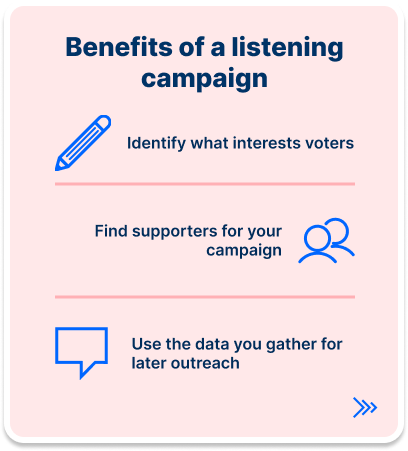
Find supporters for your campaign. Voter responses to your listening program can help determine who supports your big issues. You can use your texting tool to mark these folks as “supporters” for future outreach. Additionally, you can tag those who were not receptive to your messages as “opposed” and add undecided folks to your persuasion campaigns.
Use the data you gather for later outreach. After identifying potential supporters and their key issues, you can create follow-up campaigns for fundraising, volunteer recruitment, and get out the vote (GOTV). Supportive folks could be more receptive to donating to your campaign, voting for you, and spreading the word about your campaign to their friends and family.
When is the best time to do a listening campaign?
Sometimes GOTV messages can overwhelm voters, especially when they arrive days before an election. Running a listening campaign in the months prior to Election Day (ideally, the summer months for a November election) can get you in front of voters before others and set you up for success. Here’s why setting up a listening campaign in the months before Election Day can set you up for electoral success later on:
Build a lasting connection with voters ahead of time
Voters do not always want to be talked at. Instead, they’d like to be part of the conversation. Focusing on listening to voter concerns, sharing the candidate's stance (if relevant), and engaging in conversation builds trust with voters. Creating multiple interactions with a campaign helps create a better relationship with voters before GOTV.
Additionally, many voters do not have experience talking to candidates or their team. This extra outreach step shows voters that the candidate will listen to their voices and consider feedback post-Election Day.
Interested in running a listening campaign? We can help >>
Early insights for your campaign
Listening allows candidates to better understand which issues matter to voters, and the earlier campaigns can do this, the better. This understanding is vital to create the right messaging for canvassing, media buys, mailers, social media campaigns, speeches, and more. All these public-facing materials are more impactful if campaigns focus on the issues that matter to people. As a staffer or candidate, you can also learn which voters will likely vote for you based on their key issues. The insights enable the curation of outreach and opposed lists, saving you time and money in the persuasion and GOTV phases.
Get better response rates from voters
In our work with campaigns that conduct listening campaigns, we’ve found better response rates during the GOTV period with lists of people first contacted with a listening campaign. The higher response rates could be because voters feel heard and are more likely to respond to later outreach. Listening campaigns also help you curate your lists and remove voters opposed to the candidate so that you might have a higher response rate for your second or third rounds of texts. Instead of wasting resources on those opposed to you, you can invest your money and volunteer time focusing on likely supporters and persuadable voters!
Prime your potential voters for follow up
Some voters need contact a few times to get them to act. With busy work, life, and family schedules, voting can easily fall on the back burner. If you’ve already started a relationship with a voter, your GOTV text about polling locations, dates, and times will not come out of the blue.
Civitech’s step-by-step guide to conducting a listening campaign
We follow some essential steps when creating a successful listening campaign. We recommend using TextOut, but you can theoretically set this up with any texting tool.
1. Create goals for the campaign
Your goals should be your first step when developing a texting campaign. With a listening campaign, common goals we’ve seen include gathering information about issues in the district, narrowing down an outreach list, and trying to identify supporters and volunteers.
2. Find your audience
After setting a goal, next you should choose your audience according to that goal and determine how to find them.
If you are interested in gathering information from all voters in the district, you use a broad list. Especially for nonpartisan races, it is vital to cast a wide net and collect as much information as possible.
If you run in a contested primary, you might only be interested in primary voters or people who belong to your political party. If your district has a close partisan split, you might care about your base and moderates/independents.
3. Write your program scripts
With your goals and audience set, the next step is writing your scripts!
Here are some areas to remember when writing scripts:
Goal: Your overall goal will help determine how basic or complex your script is. Luckily, a listening campaign is relatively simple if you use one initial question and group your expected responses into categories.
Audience: We all speak differently to different groups, so consider your audience when crafting a script. If it’s a partisan audience, feel free to reference the Democratic Party.
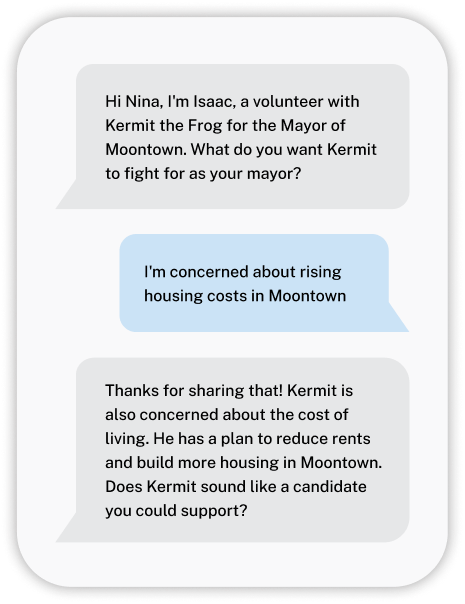
Brevity: How can you be concise while still getting your message across? We’ve all received those political texts that are closer in length to an email. Do they work? Our programs have seen the best results with conversational and concise messages that don’t overwhelm recipients.
Messaging: Because you are trying to gather information about issues in this campaign, you’ll likely want to be open and inviting with your messaging.
Typically, we see the best results with clients who send just one simple initial outbound message (IOB) to begin without too much information about the candidate or organization. We’ve seen better results by gauging how folks react to the initial message and then sending more messages depending on how they respond.
You can choose your responses to voters sharing their thoughts and feelings. Some candidates offer up their issue positions or share a relevant endorsement or a link in response. Others will ask other detailed follow-up questions to understand the voter’s perspective. Either way, thank the voter for responding and engaging with the campaign.
Call to action: Basically, what do you want your audience to do? Alternatively, what answer do you want from them? In the case of a listening campaign, you are hoping to get more information on the issues that matter to voters and, ideally, gauge their interest in volunteering and voting.
Are you looking for more details? We’ve included an example texting script below to help you get started.
4. Start texting
Now is the time to text voters! You should anticipate a range of responses from recipients in listening campaigns that fall into three main categories: supporters, opposed, and needs more information. You will need to train the volunteers or staff who engage with voters. Topics include how to respond to voters, if and when they can go off script, and managing voters who want to be opt-ed out. Ideally, your texting software will allow you to add real-time data tags while texting, as TextOut does.
We recommend personalizing responses based on these categories:
Supporters
Supporters are folks who are enthusiastic about your messaging. Supporters could agree with the causes you’ve mentioned, show an interest in talking to you, or be open to discussions. We recommend preparing scripts for these folks that give more information about your stance on their issue, your campaign generally, volunteer information, and more.
Opposed
Opposed would be people who were against your messaging or shared stances on issues against your beliefs. They could also be people who were aggressive, opposed the candidate, or were generally hostile toward the text messages. You will likely not want to follow up with this group in the future.
Needs more information
Some folks are not negative or positive about your messaging and want more information, which makes sense! We recommend having scripts that give more information about the issues, why they receive messages, and a call to action to learn more.
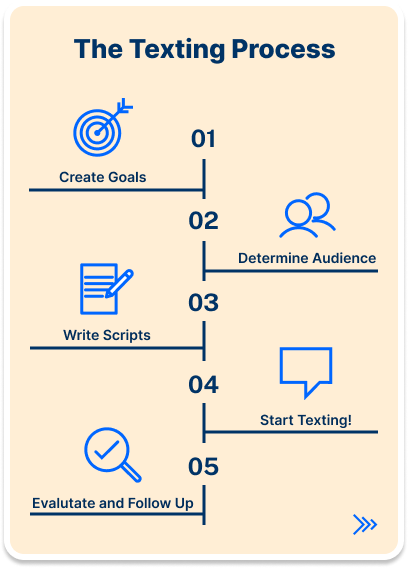
5. Evaluate responses and plan your follow up
Once you have your data from the campaign, it is time to sift through them and make decisions! Based on your data tags, you can plan follow-up based on people’s responses to the listening campaign.
For supporters, you can send follow-up messages about the candidate’s endorsements, events, and volunteer opportunities. Let them know how the candidate aligns with the voter and their values. These folks are ideal to reach out to with persuasive messages later in the campaign since they will likely vote for the candidate. Plus, during GOTV, you can follow up with a text that provides early voting info and the details for voting on Election Day!
You can also create volunteer outreach lists from your supporters, with a follow-up text later, or add the question to your initial script for people who express support.
These volunteers can help spread the word about your campaign by knocking on doors, sending texts, calling supporters, fundraising, and more.
Undecided voters would be great candidates for follow-up persuasion messaging, whether delivered via text, canvassing, mailing, or other tactics.
Best practices for a successful listening campaign
Now that you have all the information on running your listening campaign, let’s talk about best practices to keep in mind!
Focus on listening
While it seems like a no-brainer, it’s worth mentioning that you should focus on listening. While it can be challenging, resist the urge to insert a quick pitch or long bio on the candidate. Take time to focus simply on what the voters are saying. The initial outbound message is the first impression voters get of the candidate. Make it a good one.
Plus, you might only need a short intro for your first interaction with voters. Basic name recognition goes a long way. It will be helpful later in texting, mail, and canvassing campaigns.
Be open to new issues on your campaign
Do your best to write scripts to account for as many issues as possible, but don’t expect all responses to fit in a box. Be open to voters bringing up issues you did not realize were important to them. Make a plan before launching the texting campaign to address new issues that arise and how to respond sincerely and quickly. Remember, this is a way to gather information without paying for formal polling (especially if budgets are tight). Use this to your advantage!
Text a broad audience, especially for local races
You want to create a targeted GOTV push with your known supporters for Election Day, but listening campaigns are an opportunity to open up your universe.
Local races in particular are an opportunity to talk to voters who might not fit your profile initially, especially if you are in a nonpartisan race. Local races create opportunities to gain support from voters no matter their partisanship because many voters are moved by local issues. Don’t be afraid to cast a wide net for initial outbound messages!
Create a plan for follow-up with voters
After your string of messages, make a plan to follow up with voters during the GOTV time. By this point, your universe will be more familiar with you! Likely, you will have had meaningful conversations with these folks, and they will trust you more than someone who waits until the days before Election Day to contact them. Send reminders about polling places, times, and dates. Given the time you’ve spent communicating with the voters, these messages will be better received.
Thinking about creating a listening campaign? Do you need software and a team for it? Civitech has you covered >>
Example script ideas
We recommend keeping your initial message short and to the point. These messages perform well as opposed to email-length messages which often go unread. We’ve included a simple script to help you begin.
| Type | Message content | Data tags |
|---|---|---|
| Initial outbound |
Hi {{ContactFirstName}}, I'm {{SenderFirstName}}, <statement-candidate-intro>. <statement-IOB-listening> What do you want <candidate-first-name> to fight for as your <elected-position>? Stop2quit |
|
|
Share candidate’s position on issue |
*Message varies and will depend on specific candidate and the issues* Election Integrity example By any standard one chooses, we have safe & fair elections in Moontown. Kermit will defend the right to vote for all legally eligible voters. We need to make sure more people vote, not fewer. |
Election Integrity |
|
Candidate position follow-up |
How does that sound to you? |
|
|
Candidate Position Followup / Support Ask |
Does <candidate-first-name> sound like a candidate you could support? |
|
| No issues (Supporter) |
Thanks for your support! We're looking for folks to join our volunteer team to <volunteer-activity> so we win on <election-date>. This election's so important and only a few <months/weeks/days> away. Will you join me as a volunteer? |
Support |
| No issues (Unknown Supporter) | OK! I'm volunteering for <candidate-first-name> because <statement-support-because> Does <candidate-first-name> sound like a candidate you can support? | |
| Undecided/More info needed |
Happy to share more! I’m volunteering for <candidate> because <they'll fight for affordable healthcare, federal funds for disaster relief and support for our veterans.> What issues matter to you? |
Undecided |
| Opposed > Open mind ask | <statement-gop> Would you be willing to keep an open mind on this race? | Opposed |
| Open Mind = Yes |
Great! Thank you. Your vote matters so much, and I'm here to answer any questions you've got about <candidate-first-name> so you've got the info you need. What issues matter most to you? |
Opposed |
| Open Mind = No | Thanks for letting me know your views. I'm glad we're both trying to improve our community, even if we don't always agree about how best to do it. I hope your day goes well. | Opposed |
| Support = Yes (Volunteer Ask) | Thanks for your support! We're looking for folks to join our volunteer team to <volunteer-activity> so we win on <election-date>. This election's so important and only a few <months/weeks/days> away. Will you join me as a volunteer? | Support |
| Volunteer = Yes (Volunteer Ask) | Wonderful, thank you! Someone from our volunteer team will be in touch soon. Thanks again for your support! | Volunteer = Yes |
| Volunteer = Maybe (Volunteer Ask) |
Ok! No problem. We'll have someone reach out to share what's involved and you can decide then! | Volunteer = Maybe |
| Volunteer = Maybe (Volunteer Ask) Website | Totally understand. The most important thing is your support and your vote! Check out <candidate-first-name>'s website: <preferred-link> to stay up to date on the issues, the campaign and <her/his/their> events. Thanks for your support! | Volunteer = No |

